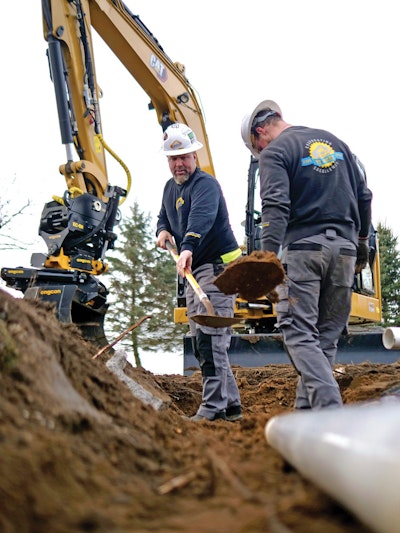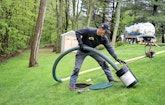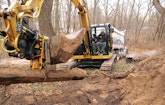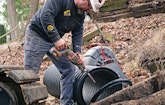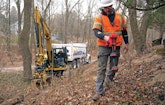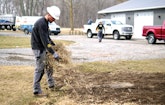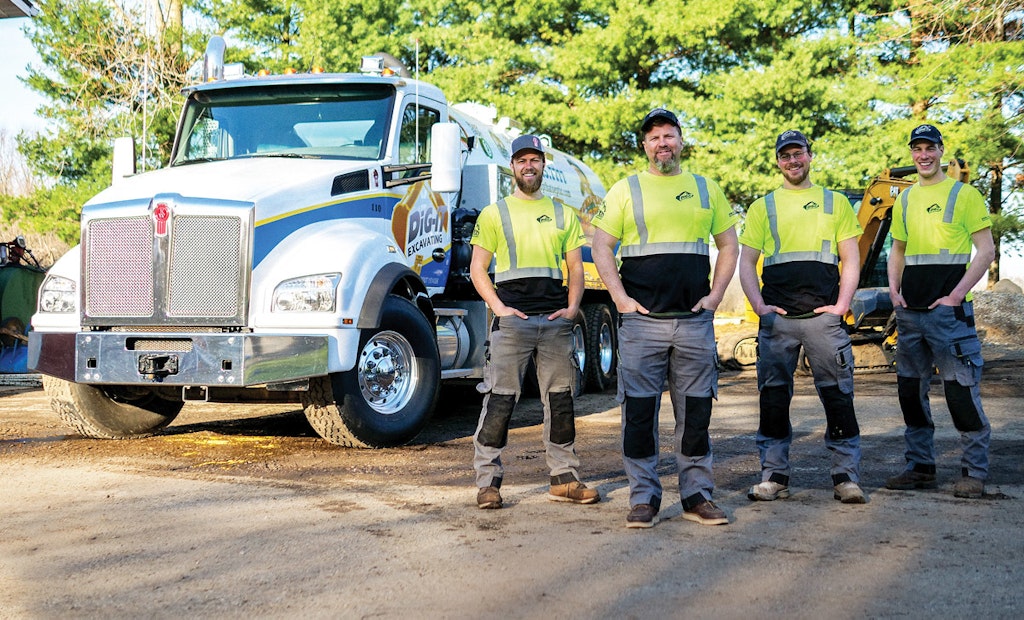
The Dig-It Excavating crew includes, from left, Lucian Witmer, Dervin Witmer, James Sanders and Joshua Sanders. They are shown with a Kenworth vacuum truck carrying Curry Supply tank and National Vacuum Equipment blower. (Photos by Lucian Witmer)
About 90 minutes east of the bustle of greater Chicago is the rural southwestern Michigan community of Cassopolis, within easy driving distance of South Bend and Elkhart, Indiana, and Kalamazoo, Michigan. This is where Dervin Witmer has built a thriving wastewater business that succeeds through diversity.
Witmer says that offering a wide range of services gives people more options and means they are more likely to become customers because Witmer and his team can provide what is needed.
That business idea has brought all the work he wants to Dig-It Excavating.
TAKING IT SLOW
Witmer is expanding his services, and taking on more work in Indiana, but he’s doing it slowly because he doesn’t want to overextend. Hydroexcavation is an example of where he wants to expand. He’s doing it already with a 1996 Vactor 2100 carrying a 5-cubic-yard tank, and he is thinking about other opportunities and what he needs to justify the purchase of a newer hydroexcavator.
In 2018 Dig-It became licensed to pump in Indiana. Technicians were already doing service work there, so the pumping added more diversity.
The company does a lot of pumping. In 2019 Witmer added a second large vacuum truck and sold a smaller vacuum truck. Technicians do a lot of simple work, he says, repairing a crushed line, for example, or installing a riser or filter upgrade. Almost every day someone is out doing septic system inspections. There’s emergency pumping for local municipalities with pump or maintenance problems. Dig-It’s small crane truck, a Ford F-450 with a 3,000-pound Cobra 3300 crane, adds to service possibilities because it can lift 25 hp pumps.
The excavating part of the company name still comes into play for demolition, driveways and new construction work, but it’s not the core of the business, Witmer says.
BREAKING IT DOWN
“We’re starting to service large commercial systems. Even if another company installed a large system, and they don’t offer maintenance, we will handle the maintenance contracts for that,” he says.
Onsite work accounts for about 50% of the company’s business, and it breaks down to about 25% new construction and 75% repairs. Residential jobs using standard septic tanks are about 75% of installations while 25% is advanced treatment units and commercial work.
Dig-It’s move into Indiana will not be without competition.
“We’re pretty new to that area, and there are a number of well-established companies there,” Witmer says.
Aside from possibly needing more equipment, adding regular work in Indiana work would require hiring a couple more people.
Witmer runs his business now with full-time workers: Olivia Witmer, his daughter who manages the office and handles dispatching; Lucian Witmer, his older son, who drives one of the vacuum trucks and handles photography and aerial photography with a drone; and Joshua Sanders, who drives a vacuum truck and does most of the inspections. Part-timers are his son, Isaiah Witmer, who runs the service van, and youngest son Steffan Witmer, who is a helper. Foreman James Sanders oversees most installations. Witmer himself works in the field, manages the business and does estimating.
WORKING ON WATER
The more interesting projects for Witmer are those using alternative technologies. For example, the lakes in his area, including Lake Michigan, have given him a chance to try out SludgeHammer equipment and fit drip irrigation into lake lots. Other alternative systems his company installs and maintain are from Aero-Tech and Singulair Green units from Norweco.
During the busy season, Dig-It installs one to two systems a week unless there’s a big commercial job in hand. Those can require a month of work divided into a week here and a week there.
For installations, Dig-It technicians rely on two pieces of equipment: a Cat 310 excavator and a Cat 299 track loader. The excavator is two years old and has an Engcon EC209 Tiltrotator that can rotate a bucket (or other attachment) 360 degrees and tilt to a 45-degree angle, very good for working in tight spaces, Witmer says. A laser catcher on the excavator links to the Trimble Earthworks system to provide precise digging and cutting.
Witmer standardized Kenworth T880s for his big truck fleet. He has three. One is a 2015 dump truck with about a 20-yard box from J&J Truck Equipment in Somerset, Pennsylvania. Like the others it’s a quad-axle.
The other two Kenworths are vacuum trucks. One is a 2015 with a 4,700-gallon steel tank from Curry Supply and carrying an NVE4310 blower from National Vacuum Equipment. (Dig-It designed and added custom-fabricated aluminum toolboxes and hose trays.) The other Kenworth is a 2018 with a 4,500-gallon Curry steel tank and the same NVE blower.
SMART EQUIPMENT
The T880 has a set-back front axle, and this brings two advantages, Witmer says. First, it shortens the wheelbase for better maneuverability. Second, because the engine sits forward, the front axle carries more engine weight. Under Michigan laws, having more weight on the steering axle increases the allowable payload on the rear axles. A companion benefit of the set-back axle is a sloped hood for better forward visibility.
Also in the inventory is the 2011 Ford F-450 service truck to carry the Cobra crane.
A 2016 Ford Transit cargo van handles drain cleaning and inspection services. It carries the RIDGID 6200 pipe rooter and the RIDGID SeeSnake 63603 camera with a fiber optic self-leveling head and CS12X monitor, and a RIDGID K9-306 FlexShaft drain cleaner.
When technicians need to move earth, they start up a 2012 Cat D5K2 LGP dozer.
“Sometimes a system might be 5 or 6 feet in the ground, so you don’t get oxygen penetration,” he says. Restoring such a system involves cutting away the surface with the dozer and then using an EarthBuster deep-soil decompactor.
A 50,000-pound AC3-25 trailer from Talbert in Indiana hauls equipment between job sites.
MAKING AN IMPRESSION
In a competitive area, publicity is a key business component, and for Dig-It this starts with the T880s. Showing up with identical, clean trucks gives Dig-It a professional image, Witmer says. His trucks are painted a base white and carry logos made by a local sign shop but designed by Witmer’s brother-in-law Ben Bredeweg. He is a graphic artist who created and maintains the company websites.
About social media, Witmer has a system to minimize the time he spends keeping up with all the online demands. The system starts with everyone carrying a company iPhone.
“And I say, when you are on a job, I want you to take one to three pictures at day. Get the trucks; get somebody working; you’ve got a nice camera, and it doesn’t take more than five seconds to snap a picture,” he says.
At the end of the day, Witmer looks through the pictures and asks himself what customers need to know about the company’s work that day. He uploads one to three pictures with simple comments. His Instagram account is linked to the Facebook, Twitter and Tumblr accounts, so posting on one updates the others automatically. Witmer says social media upkeep takes about 15 minutes out of his day.
Another part of Dig-It publicity is radio ads. One month he might talk about what not to flush into a septic system. For another month the topic might be real estate inspections. He drives to the radio company’s studio, talks about ideas with advertising representatives, and spends about 30 minutes recording one ad. Last year he had a California company create a jingle.
Check out an ad for Dig-It and Pump That Septic here:
“And we have had, in this last year and a half, so many people tell us, yeah, I heard you on the radio,” he says.
More importantly, the marketing produces business. “There’s a good percentage of people who have already decided they’re going to use us when they call us,” he says. They’ve watched a company video on YouTube, for example, and comment on it when they call. The best use of money right now is radio, social media, and just a few Google ads, he says.
A GREATER REACH
Publicity extends to the detail of having custom lids molded by RomoTech in New Paris, Indiana. Lids bear the company’s name, phone number and website, and technicians install them at every opportunity.
Witmer is looking ahead to other possibilities as well. There is a relatively new internet domain called .services, and when Witmer checked, he found the septic.services name was available, so he spent a few hundred dollars and secured it. He hasn’t worked out yet how to use the new domain, but he owns it and can take his time.
In fall 2020 Witmer made a big commitment to his company by breaking ground on a new shop and office structure of 9,600 square feet. “We’re growing, and (interest) rates are good,” he says. “And right now we work out of a pole barn at my house.”
The pole barn is only 1,920 square feet, and the office is in his house. He started on the new building in 2018 when he bought a 10-acre commercial site south of Cassopolis. During the next two years he added a driveway and did other site preparation.
The new building will have four truck bays, three for mechanical work and one for washing equipment. Inside will be offices, conference rooms and a lobby for visitors.
“It’ll just be nice to have more room,” Witmer says. “One of my guys, Jim Sanders, does some of our light mechanic work, and he’ll have a nice area for doing oil changes and brakes.”
The new shop will also help expand work in Indiana because it’s only a 15-minute drive from the border.
ENJOYING THE LIFE
At age 44, Witmer still has many working years ahead to build his business, except it’s pretty much grown to the extent he envisioned. There is still hydroexcavation, which he circles back to because it’s on his mind as a good service to provide.
“There’s a lot of infrastructure around here like electric and power. There’s some nuclear plants in the area by Lake Michigan,” he says. If he can find openings with those infrastructure companies, Witmer may commit to a $500,000 hydroexcavator.
“It’s an employee and job and opportunity scenario that I haven’t figured out yet,” he says. “I don’t stay up at night saying, ‘I don’t have a nice hydrovac truck yet.’”
That’s because to him, growth is not and end in itself.
“I enjoy what I’m doing, and if I got too busy it would become stressful, and then it starts to control me,” he says. “I’m not living to become the next Jeff Bezos. I’m living to provide a professional service, and do it well, and have a good life doing it.”
